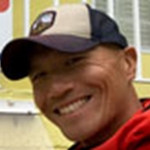
David Huang
David was born and raised in the concrete jungle of New York City, where the only three animals he ever knew were squirrels, pigeons, and rats. His curiosity of the wider natural world was piqued by the occasional trip to the beach, visits to the Bronx Zoo, and nature programs he would watch on the television. After high school, David decided to satisfy his curiosity and made his way out west. He eventually landed at the University of California, Santa Cruz where his immersion into the natural world began.
While at the university, David was fortunate enough to be involved in a variety of research projects. He was able to study fish population genetics along the Pacific Coast and Gulf of California, coral physiology in the Caribbean, kelp forest ecology in Baja California, marine mammal diets in the Sea of Cortez, lobster recruitment and migration patterns in New England, and foraminifera diversity in Antarctica.
David is currently a marine scientist at the University of California, Santa Barbara's Marine Science Institute where he studies kelp forest and marine wetland ecology. In addition to his work for UCSB, he is also a volunteer first responder in San Diego where he works with the county's search and rescue teams as an Emergency Medical Technician, Public Safety Diver, Unmanned Aerial Systems Pilot, and Technical Rescue Instructor.
